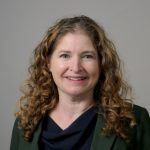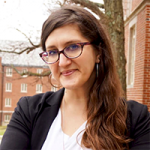

Professor Beth Russell and Professor Eva Lefkowitz quoted in an article in the CT Post on the importance of maintaining personal connections during the pandemic. Read the article here.


Professor Beth Russell and Professor Eva Lefkowitz quoted in an article in the CT Post on the importance of maintaining personal connections during the pandemic. Read the article here.
 Associate Professor Laura Mauldin, 2021-2022 UConn Humanities Faculty Fellow. Congratulations Laura! Read the announcement in UConn Today.
Associate Professor Laura Mauldin, 2021-2022 UConn Humanities Faculty Fellow. Congratulations Laura! Read the announcement in UConn Today.
 Dr. Alaina Brenick is a scholar-activist dedicated to the interdisciplinary and translational approaches fundamental to the field of Human Development and Family Sciences. Drawing from social and developmental psychology, education, social work, and sociology, she is interested in identifying and examining individual, micro-, and macro-level factors that contribute to intergroup conflict, as well as the conditions necessary for reducing prejudice, discrimination, and victimization across development. Specifically, her research focuses on how diverse groups of children, adolescents, and young adults in the U.S. and in other regions of the world—sometimes with vastly different societal structures, norms, and expectations—experience, reason about, and respond to intergroup relations and group-based victimization (e.g., discrimination, denial of rights, bullying, exclusion based on one’s group membership/identity). She is committed to translating her work into practice. Her work provides a fundamental knowledge base for creating contextually and developmentally appropriate intervention programs, designed to reduce individual prejudice and systemic oppression and promote social equity and positive intergroup relations.
Dr. Alaina Brenick is a scholar-activist dedicated to the interdisciplinary and translational approaches fundamental to the field of Human Development and Family Sciences. Drawing from social and developmental psychology, education, social work, and sociology, she is interested in identifying and examining individual, micro-, and macro-level factors that contribute to intergroup conflict, as well as the conditions necessary for reducing prejudice, discrimination, and victimization across development. Specifically, her research focuses on how diverse groups of children, adolescents, and young adults in the U.S. and in other regions of the world—sometimes with vastly different societal structures, norms, and expectations—experience, reason about, and respond to intergroup relations and group-based victimization (e.g., discrimination, denial of rights, bullying, exclusion based on one’s group membership/identity). She is committed to translating her work into practice. Her work provides a fundamental knowledge base for creating contextually and developmentally appropriate intervention programs, designed to reduce individual prejudice and systemic oppression and promote social equity and positive intergroup relations.
A first step of scholar-activism in Dr. Brenick’s work has been to develop assessments appropriate for the minoritized groups with whom they are used. She believes that when working with minority groups, especially dealing with topics of social inequity and victimization, it is critical to accurately reflect and assess their lived experiences. As a result, she is working with members of the transgender and gender non-binary communities directly to develop a comprehensive measure of individual and institutional discrimination experienced by this community. Previously, in collaboration with Dr. Linda Halgunseth, she worked directly with immigrant youth and their parents to develop a measure of bias-based bullying of immigrant youth. The voices of these communities are now empowered in the field through precise representation.
A second step in Dr. Brenick’s scholar-activism is to decenter the U.S. dominated ethnocentrism in the field of research. Across her career, including during her graduate studies, her post-doctoral training at Friedrich Schiller Universität in Jena, Germany, and her current work, Dr. Brenick has collaborated internationally. Applying a systemic approach to her research, she has explored not just the influences of schools, families, and peers, but also the larger socio-political and historical contexts of youth intergroup dynamics. Her work has assessed the hierarchical social structure of immigrant groups in Germany, children who had or had not been displaced by the Colombian civil war, and the ongoing relations between Palestinian, Palestinian-Israeli, and Jewish-Israeli youth.
An anti-racist perspective guides Dr. Brenick’s work, emphasizing foci on undoing systems of oppression. In the Middle East, she has designed and evaluated numerous multi-level prejudice reduction interventions. She has collaborated with Sesame Workshop to effectively implement media-based educational programing on Sesame Street to increase understanding of others and reduce prejudice among Palestinian, Palestinian-Israeli, and Jewish-Israeli pre-kindergarteners. Dr. Brenick has also designed interventions that teach social-emotional skills such as empathy, or that provide opportunity for contact between Palestinian-Israeli and Jewish-Israeli children, allowing them to get to know one another and build meaningful relationships with one another. These interventions have been tested longitudinally and in comparison to control groups; they been highly effective in reducing affective, cognitive, and behavioral prejudice and increasing positive bystander interventions in the face of discrimination toward the outgroup. Finally, Dr. Brenick and her colleagues designed a mindfulness intervention in which the ongoing conflict was not mentioned at all. This intervention helped Jewish-Israeli elementary students learn to care for the self, to care for others who were close to them, and then to care for others in general (even those they don’t like). The mindfulness intervention reduced affective prejudice and stereotyping and increased willingness for contact with the outgroup. Dr. Brenick’s intervention work shows great promise for anti-racist action even in the midst of ongoing conflict.
In a recent chapter adopting an anti-racist approach, (No) space for prejudice! Varied forms of negative outgroup attitudes and ethnic discrimination and how they develop or can be prevented in the classroom, Dr. Brenick and her colleagues systemically reviewed the literature on prejudice in schools. The chapter is published in the Handbook of Children and Prejudice: Integrating Research, Practice, and Policy—downloaded over 40,000 times! https://link.springer.com/book/10.1007/978-3-030-12228-7 —and emphasizes turning knowledge and awareness into practice and policy. It is also being turned into a video series, with the Center for Culture, Health, and Human Development, to help make educational environments safer and more inclusion for all students.
Finally, Dr. Brenick’s scholarship and activism are deeply connected to her mentorship model. She is dedicated to mentoring undergraduate students, especially first-generation students and students from underrepresented minority backgrounds (64% of her mentees). Her student mentees are integrally involved in her work, having co-authored 22 manuscripts and over 60 international and national conference presentations. Additionally, Dr. Brenick has sponsored or PI’ed eight small research grants awarded to her undergraduate mentees to promote their active and early engagement in research. In honor of her mentorship success, she was awarded the UConn Honors Faculty Member of the Year Award and nominated by her mentees for the Society for the Psychological Study of Social Issues Outstanding Teaching and Mentoring Award.
Dr. Brenick will always call the charm city, Baltimore, MD, her hometown. Another point of great pride for Dr. Brenick is that Lizzie’s food truck on campus has a veggie burger named for her. Additionally, she loves to garden and tends to over 40 indoor plants (and more every day), to eat when others cook, to knit and crochet—especially fun stuffed animals for her niblings, to take long walks while talking to good friends, and to travel and learn about new people and places. Dr. Brenick’s most important roles are as co-parent to Trent and as World’s Greatest Tanta to her many niblings.
 Professor Marlene Schwartz was featured in UConn Today for her work developing a toolkit to support food banks and pantries to measure nutritional quality (read the article here). Marlene was also featured in Bakery and snacks.com in an article, Some of the Science Behind Our Snacking Habit (read the article here).
Professor Marlene Schwartz was featured in UConn Today for her work developing a toolkit to support food banks and pantries to measure nutritional quality (read the article here). Marlene was also featured in Bakery and snacks.com in an article, Some of the Science Behind Our Snacking Habit (read the article here).
 In recognition of significant and sustained contributions to the science of psychology, the Board of Directors of the Eastern Psychological Association has granted Ronald P. Rohner the status of Fellow of the Eastern Psychological Association.
In recognition of significant and sustained contributions to the science of psychology, the Board of Directors of the Eastern Psychological Association has granted Ronald P. Rohner the status of Fellow of the Eastern Psychological Association.
 Professor Marlene Schwartz was featured on Food Issues with Julie Relevant, Episode 001: Feeding Kids in 2021
Professor Marlene Schwartz was featured on Food Issues with Julie Relevant, Episode 001: Feeding Kids in 2021
14 HDFS faculty and 15 HDFS graduate students will be giving 26 presentations at the SRCD Virtual conference, April 7 – 9. Topics include parental control and Chinese adolescent’s depression; anti-racist interventions with Palestinian/Jewish Israeli individuals; avoiding ethnocentrism in research; math skill development in early childhood; and more than 10 presentations related to child, adolescent, college student, and parent well-being during COVID-19. Find a list of all of the exciting talks and posters here
 Assistant Professor Jolaade Kalinowski was featured in UConn Today for her important research on Health Disparities for Black women. Read the article here.
Assistant Professor Jolaade Kalinowski was featured in UConn Today for her important research on Health Disparities for Black women. Read the article here.
 Professor Marlene Schwartz was featured in US News & World Report, The Conversation, and many other newspapers in a recent story, How Connecticut Schools Have Gotten Lunch to Kids Who Need it. Read her story in The Conversation.
Professor Marlene Schwartz was featured in US News & World Report, The Conversation, and many other newspapers in a recent story, How Connecticut Schools Have Gotten Lunch to Kids Who Need it. Read her story in The Conversation.
A research paper that undergraduate student Isabella Otoka wrote for HDFS 2004W in Spring, 2020, Panic Disorder and Parent Child Communication was selected as the winner of the Aetna Writing in the Disciplines Awards in the social sciences division. Congratulations!
Professor Edna Brown was the instructor, and graduate student Mackenzie Wink was the TA who nominated Isabella. The Aetna Writing in the Disciplines Awards recognize exemplary academic writing by undergraduate students across the sciences, social sciences, humanities, and professional schools. Each of three winners will receive $200, thanks to funding from the Aetna Chair of Writing Endowment.